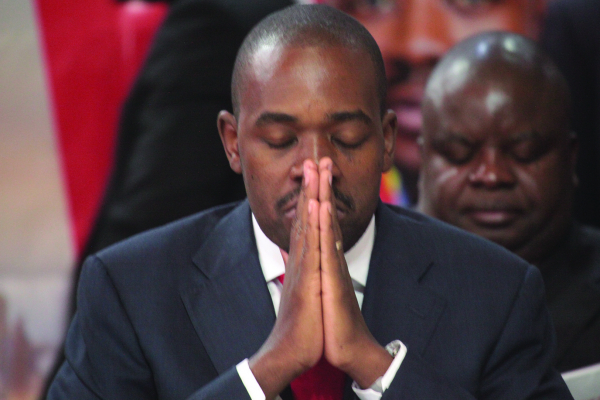
MDC Alliance leader Nelson Chamisa should consider President Emmerson Mnangagwa’s offer to make him official leader of the opposition with caution as he risks sinking into political oblivion, analysts have warned.
By Everson Mushava
Mnangagwa disclosed during a meeting with United Kingdom Minister of State for Africa, Harriett Baldwin, on the sidelines of the United Nations General Assembly on Monday that he intended to set up the “office of the leader of opposition”.
This was in line with the Westminster type of government as the country hoped to be readmitted into the Commonwealth.
Mnangagwa’s spokesperson, George Charamba says his boss was not creating the position for an individual, but seeking to build institutions for inclusive and sustainable democracy.
The system has worked in many countries, including England and Canada, which use the Westminster parliamentary system.
In those democracies, the opposition is regarded as an alternative government and the leader of the opposition as an alternative Prime Minister and the shadow Cabinet produces alternative policy documents.
By virtue of representing the biggest opposition in the country, Chamisa will automatically qualify as the leader of the opposition with government perks, while the face of his party in Parliament will remain Thabita Khumalo, who was appointed opposition leader in the House after the July 30 elections won by Mnangagwa, but rejected by the MDC Alliance.
- Chamisa under fire over US$120K donation
- Mavhunga puts DeMbare into Chibuku quarterfinals
- Pension funds bet on Cabora Bassa oilfields
- Councils defy govt fire tender directive
Keep Reading
But while analysts and politicians welcomed the decision, they have warned Chamisa to be wary of Mnangagwa’s motives, which they say could be self-serving.
The analysts urged Mnangagwa to make electoral reforms first before making the giant move, which they said could only work in mature democracies like Britain.
“The MDC Alliance needs to be very cautious with Mnangagwa’s overtures. If Mnangagwa is serious about political reforms, he should start by repealing some controversial media and electoral laws on the country’s statutes,” Reward Mushayabasa, a United Kingdom-based media trainer, says.
It is possible that Mnangagwa was seeking to use Chamisa to legitimise his rule because his proposal cannot strengthen democracy in the absence of critical reforms, Mushayabasa added.
Another political analyst, Maxwell Saungweme, said Mnangagwa was making the offer for selfish interests to court foreign capital and enhance his success at re-engagement with the West.
He, however, said the move was a step in the right direction, which would give Chamisa a platform to push for electoral reforms.
“Providing Chamisa with perks also allows Mnangagwa to keep the young man in check through carrot and infiltration,” Saungweme said.
“So to Mnangagwa, it is a multi-pronged non-adversarial strategy to reign in opposition while pursuing economic growth and better relations with the rest of the world.”
Bulawayo-based political analyst Dumisani Nkomo said Chamisa should strategise first before making a move because blindly entering into an agreement with Mnangagwa would be disastrous for his political career.
“If the MDC accepts the offer without strategy, it is doomed. If it declines the offer without strategy, it is doomed again,” Nkomo said, adding Mnangagwa’s offer appeared a good move to foster inclusivity in a democracy.
MDC Alliance spokesperson Jacob Mafume said Mnangagwa was simply trying to institutionalise certain people as opposition forever.
“Our problem is legitimacy and stolen elections,” Mafume said.
“It is a cynical attempt to divert the people’s attention from the real issue of legitimacy and a stolen vote. They want to pretend that the opposition is part of governing. How does that address the democracy and legitimacy deficiency?”
However, in Britain where the system has worked, David Cameroon took over as Prime Minister in 2010 after serving as the leader of opposition.
Jealousy Mawarire, spokesperson of the National Patriotic Front, said Mnangagwa should first engage opposition parties, churches, civil society to reform State and institutions like the Zimbabwe Electoral Commission.
He said Mnangagwa’s proposal was meant to give Zanu PF a reprieve as was the case with the Government of National Unity, which ran from 2009 to 2013.







